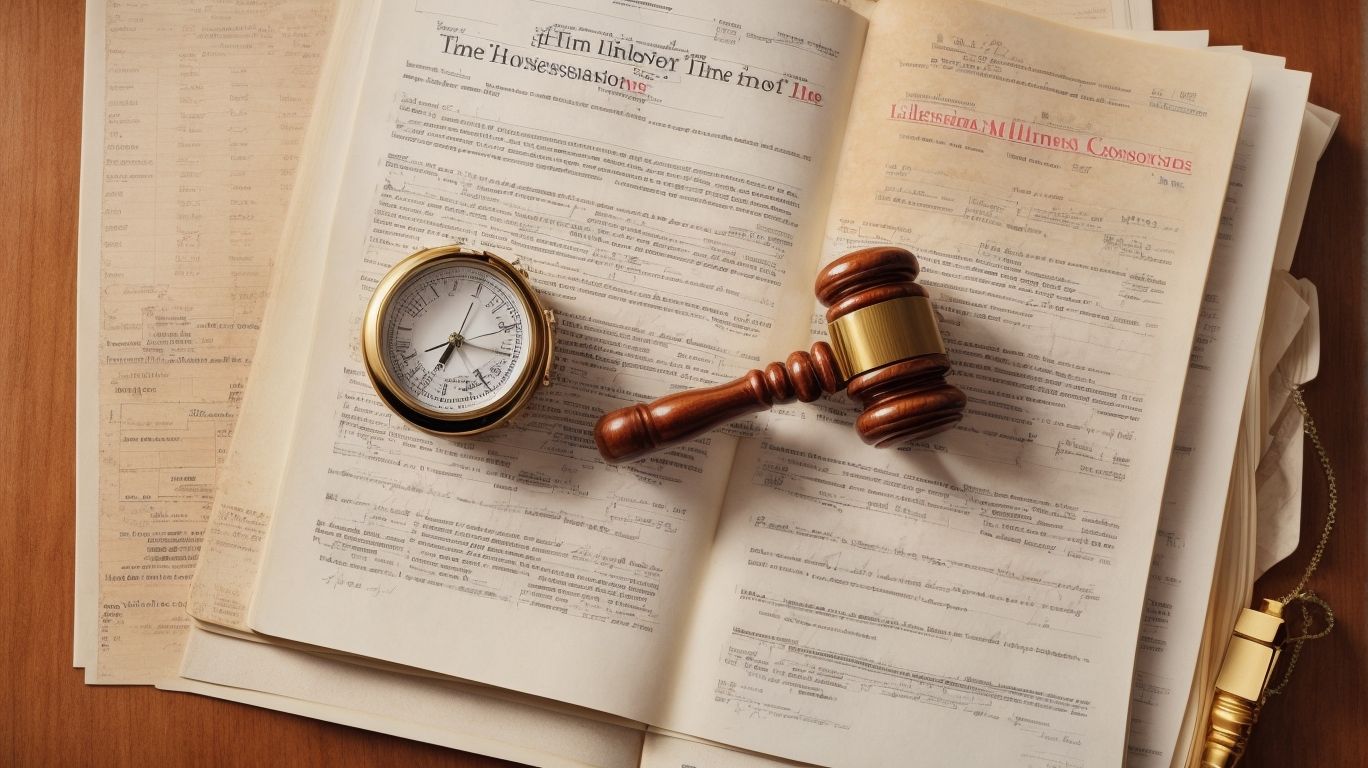What Are the Time Limits for Confiscation Proceedings After Conviction?
Understanding the time limits for confiscation proceedings confiscation proceedings after conviction play a crucial role in the legal system, aiming to confiscate the proceeds of crime and prevent criminals from benefiting from their unlawful activities. However, it is important to understand that there are time limits for confiscation proceedings after conviction.
These time limits serve specific purposes and ensure a fair and efficient process. Time limits for confiscation proceedings can be categorised into different stages. The initial confiscation order, default sentences for non-payment, variation of confiscation orders, and extension of time limits are some of the key aspects to consider.
Each stage has its own specific time limit, and compliance with these time limits is essential for the effective implementation of confiscation orders. Several factors can affect the time limits in confiscation proceedings. The complexity of the case, the cooperation of the defendant, and the identification and valuation of assets are some of the factors that can influence the duration of the proceedings.
Properly assessing these factors is important for determining the realistic time frame for completing the confiscation process. Exceeding the time limits in confiscation proceedings can have significant implications. Firstly, it may result in the loss of enforcement powers, limiting the authorities’ ability to effectively seize and confiscate the proceeds of crime.
Exceeding time limits can potentially lead to claims for infringement of human rights, as prolonged proceedings can be seen as a violation of the defendant’s right to a timely resolution.
Understanding Time Limits for Confiscation Proceedings

Photo Credits: www.makwanas.co.uk by Bradley Walker
Understanding the time limits for confiscation proceedings is crucial for both defendants and prosecutors. To fully grasp these time limits, it is essential to follow this step-by-step guide:
1. Consult legal experts: Seek advice from experienced legal professionals who can provide comprehensive understanding of the specific time limits associated with confiscation proceedings.
2. Conduct research on relevant legislation: Study the applicable laws and regulations that govern confiscation proceedings. This will provide valuable insight into the time constraints involved.
3. Consider the date of conviction: Keep in mind that time limits for initiating confiscation proceedings usually start after the defendant’s conviction.
4. Determine the applicable time frames: It is important to note that different jurisdictions may impose varying time limits. Therefore, it is crucial to identify the precise time frames that are relevant to your particular case.
5. Adhere to deadlines: To ensure compliance, both defendants and prosecutors must strictly adhere to the specified time limits for each stage of the confiscation proceedings.
6. Request extensions if necessary: If certain circumstances arise, it may be possible to seek an extension for meeting specific time limits. We recommend consulting legal professionals for guidance on this matter.
What is the Purpose of Time Limits?
Time limits for confiscation proceedings serve several purposes. They ensure a timely resolution to cases, promoting efficiency in the legal system. They provide certainty for both defendants and victims by setting a framework for the process.
Time limits help prevent undue delays and ensure that justice is served in a timely manner. Time limits encourage both the prosecution and the defendant to prioritise and actively engage in the proceedings. By adhering to these time limits, the court can maintain control over the process and mitigate the risk of potential human rights violations.
Time limits in confiscation proceedings serve to uphold the principles of fairness, efficiency, and timely resolution of cases. The purpose of time limits is to ensure a timely resolution of cases, promote efficiency in the legal system, provide certainty for defendants and victims, prevent undue delays, and uphold the principles of fairness, efficiency, and timely resolution of cases.
Time Limits for Confiscation Proceedings after Conviction

Photo Credits: Www.Makwanas.Co.Uk by Philip Miller
Confiscation proceedings after conviction: time is not on your side! Discover the crucial details of time limits in this legal process. From the initial confiscation order to consequences for non-payment, we’ll unravel the complex web of variations and extensions involved. Get ready for an insightful journey through the intricate timeline of confiscation proceedings. Brace yourself for surprising facts, figures, and the true impact of time on the outcome of these cases.
Initial Confiscation Order
An initial confiscation order, also known as ICO, is a crucial step in confiscation proceedings after a conviction. It is issued by the court to establish the amount of money or assets a convicted individual must pay or forfeit as a result of their criminal activities. This initial confiscation order, referred to as ICO, is based on the defendant’s benefit from the criminal conduct.
The aim of the ICO is to deprive them of their ill-gotten gains and prevent them from benefiting further from their illegal activities. The amount specified in the initial confiscation order, ICO, should be paid within a designated timeframe. Failure to comply with the ICO may result in default sentences or additional penalties.
Default Sentences for Non-Payment in Confiscation Proceedings
Default sentences for non-payment in confiscation proceedings are a legal consequence that arises when a convicted defendant fails to comply with the required confiscation order. This particular sub-topic can be elaborated upon with a helpful bulleted list:
- Enforcement action: In the event that the defendant neglects to make payment within the specified timeframe, the courts possess the authority to impose default sentences. These sentences can range from imprisonment to additional fines.
- Timeframe: The court assigns a deadline for payment, and if the defendant fails to adhere to this, a default sentence could potentially be imposed.
- Consequences of non-payment: The primary objective of default sentences is to ensure that payment is made, promote compliance, and discourage non-payment in future cases.
- Please bear in mind that the exact nature of default sentences for non-payment can vary depending on the jurisdiction and the specific circumstances surrounding the case.
Variation of Confiscation Orders
The variation of confiscation orders involves making changes to the original order based on certain factors. These factors can include the discovery of new assets, valuation discrepancies, or changes in the defendant’s circumstances. It is important to have a legal framework in place allowing for the variation of confiscation orders to ensure fairness and accuracy in the confiscation process.
By incorporating this flexibility, the justice system can adapt to changing situations and make necessary adjustments to achieve a just outcome. The variation of confiscation orders helps to maintain the integrity of the confiscation process and ensures that the correct amount is confiscated from the defendant.
Extension of Time Limits
- Application: In order to obtain an extension of time limits, the prosecutor must submit an application to the court.
- Reasons: The prosecutor needs to present valid reasons, such as the complexity of the case or difficulties in asset identification or valuation, for the requested extension.
- Burden of Proof: It is the responsibility of the prosecutor to provide evidence demonstrating the necessity of the extension.
- Court Decision: The court will review the application and make a decision based on the merits of the case, whether to grant the extension.
By adhering to these steps and offering adequate justification, it is possible to secure an extension of time limits for confiscation proceedings.
Factors Affecting Time Limits

Photo Credits: www.makwanas.co.uk by Thomas Mitchell
When it comes to the time limits for confiscation proceedings after conviction, several factors play a crucial role. In this section, we’ll unravel the various elements that can impact these time limits. From the complexity of the case to the cooperation of the defendant, assets identification and valuation, loss of enforcement powers, and potential claims for infringement of human rights – each sub-section will shed light on a distinctive factor that can affect the time frame of confiscation proceedings.
Get ready to dive into the intricacies of this critical legal process.
Complexity of the Case
The complexity of a case is a crucial factor to consider when determining time limits for confiscation proceedings after conviction. Incorporating the complexity of the case is necessary as it may involve a substantial number of assets that need to be identified and valued, resulting in a significant extension of the duration of the proceedings.
If the defendant demonstrates a lack of cooperation or if there are obstacles in collecting evidence, the complexity of the case increases further, leading to a longer time frame. Therefore, it is imperative for the prosecution to thoroughly evaluate the complexity of the case to establish realistic time limits and allocate adequate resources, ensuring a seamless and efficient confiscation process.
Cooperation of the Defendant
Cooperation of the defendant is a vital aspect in confiscation proceedings. It pertains to the willingness of the defendant to collaborate and adhere to authorities throughout the confiscation process. The extent of cooperation can profoundly impact the duration and outcomes of the proceedings.
By willingly providing information regarding their assets, assisting in the identification and evaluation of said assets, and promptly making payments, defendants can help facilitate a smoother and more efficient process. Conversely, a lack of cooperation can result in delays, additional investigations, and potential legal ramifications.
It is in the defendant’s best interest to actively cooperate with authorities to ensure a fair and timely resolution.
Assets Identification and Valuation
Proper identification and valuation of assets play a crucial role in confiscation proceedings. Assets Identification and Valuation are important for determining the amount to be confiscated. This information helps in ensuring that offenders do not retain their ill-gotten gains.
Key factors to consider include the type and value of assets, their location, and any potential changes in value. Accurate identification and valuation require expertise and thorough investigation. Obtaining professional assistance can ensure that all relevant assets are accounted for and valued correctly, preventing any discrepancies or disputes during the confiscation process.
Loss of Enforcement Powers
Exceeding time limits in confiscation proceedings after conviction can result in the loss of enforcement powers for authorities. When the established time frame is surpassed, law enforcement agencies may no longer have the ability to seize and confiscate assets related to criminal activity.
This loss of enforcement powers could have significant implications for recovering illicitly gained assets and deterring future criminal activity. It is crucial for authorities to adhere to time limits in order to carry out the confiscation process effectively and ensure that proceeds from criminal activities are properly addressed. Failure to do so may lead to potential claims for infringement of human rights.
Potential Claims for Infringement of Human Rights
Potential Claims for Infringement of Human Rights can arise if the time limits for confiscation proceedings after conviction are not followed. Defendants who argue that their rights to a fair trial and due process have been violated due to excessive delays in the proceedings can make these claims.
Factors such as the complexity of the case and the identification and valuation of assets can contribute to potential delays in the time limits. Infringement of human rights can result in the authorities losing their enforcement powers and facing potential legal consequences. It is crucial for all parties involved to ensure that the time limits are respected in order to uphold the principles of justice and protect human rights.
Frequently Asked Questions
What are the time limits for confiscation proceedings after conviction?
Confiscation proceedings after conviction are subject to certain time limits as outlined in the Proceeds of Crime Act. These time limits are designed to ensure that the process is fair, efficient, and effective in depriving criminals of their ill-gotten gains. Here are the key time limits to be aware of:
From the time of conviction, how long do the authorities have to commence confiscation proceedings?
The authorities have 6 years from the date of conviction to commence confiscation proceedings. This time limit is set out in Chapter 1 of the Proceeds of Crime Act.
Can the authorities apply for confiscation orders against abscondees?
Yes, under Chapter 2 of the Proceeds of Crime Act, the authorities can apply for confiscation orders against abscondees within 6 years of their conviction, even if they are no longer present within the jurisdiction.
Is it possible to request a postponement of the confiscation proceedings?
Yes, under certain circumstances, it is possible to request a postponement of the confiscation proceedings. This is covered in Chapter 3 of the Proceeds of Crime Act. However, it is important to consult with legal aid or legal professionals to understand the specific requirements and process for requesting a postponement.
How much time is typically provided to pay the confiscation order?
The terms of the confiscation order, including the time given to pay, are determined on a case-by-case basis. Chapter 4 of the Proceeds of Crime Act provides guidance on the terms and options available for payment. It is essential to consult with legal aid or legal professionals to understand the specific terms and options for paying a confiscation order.
Can a confiscation order be reconsidered or reviewed?
Yes, it is possible to seek a reconsideration of a confiscation order under certain circumstances. Chapter 5 of the Proceeds of Crime Act outlines the process for requesting a reconsideration. It is recommended to seek legal advice or consult with legal aid to understand the specific requirements and options for seeking a reconsideration of a confiscation order.
What role does Makwana Solicitors play in the confiscation proceedings process?
Makwana Solicitors, a reputable firm with expertise in crime and fraud, can provide specialist support and advice in confiscation proceedings. With their comprehensive accounts, years of experience, and panel of expert witnesses, they can assist in calculating loss, preparing detailed accountancy reports, and reducing the benefit figure.
Thank you for reading this post, don't forget to subscribe!
Notice: Informational Content Disclaimer
The content provided on this website, including articles, blog posts, and other informational materials, is intended for general informational purposes only. It is not intended as, and should not be considered, legal advice.
Visitors to this website should be aware that the information presented here is not a substitute for seeking legal advice from a qualified solicitor or legal professional. Each individual's legal situation is unique, and the information provided may not be applicable to specific circumstances.
If you require legal advice or have specific legal questions, we encourage you to contact us directly. Our experienced team of solicitors is here to assist you with your legal needs and provide tailored advice to address your concerns.
Please be advised that any communication through this website, including the use of contact forms or email, does not create a solicitor-client relationship. Confidential or time-sensitive information should not be sent through this website. To establish a solicitor-client relationship and discuss your legal matters in detail, please contact us for a consultation.
We strive to provide accurate and up-to-date information, but we make no representations or warranties regarding the accuracy, completeness, or suitability of the information contained on this website. We shall not be liable for any reliance placed on the information provided herein.
Thank you for visiting our website. We look forward to the opportunity to assist you with your legal needs.




